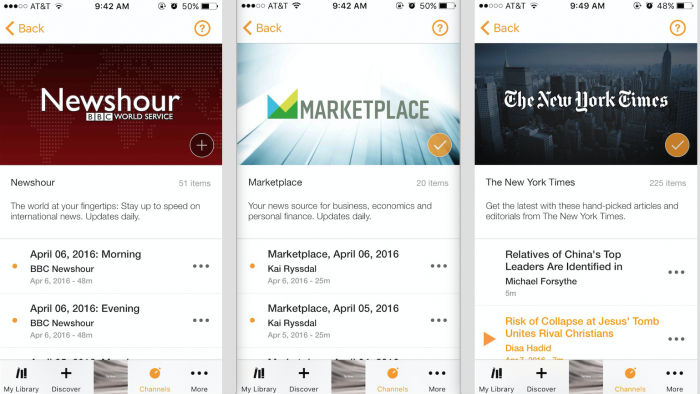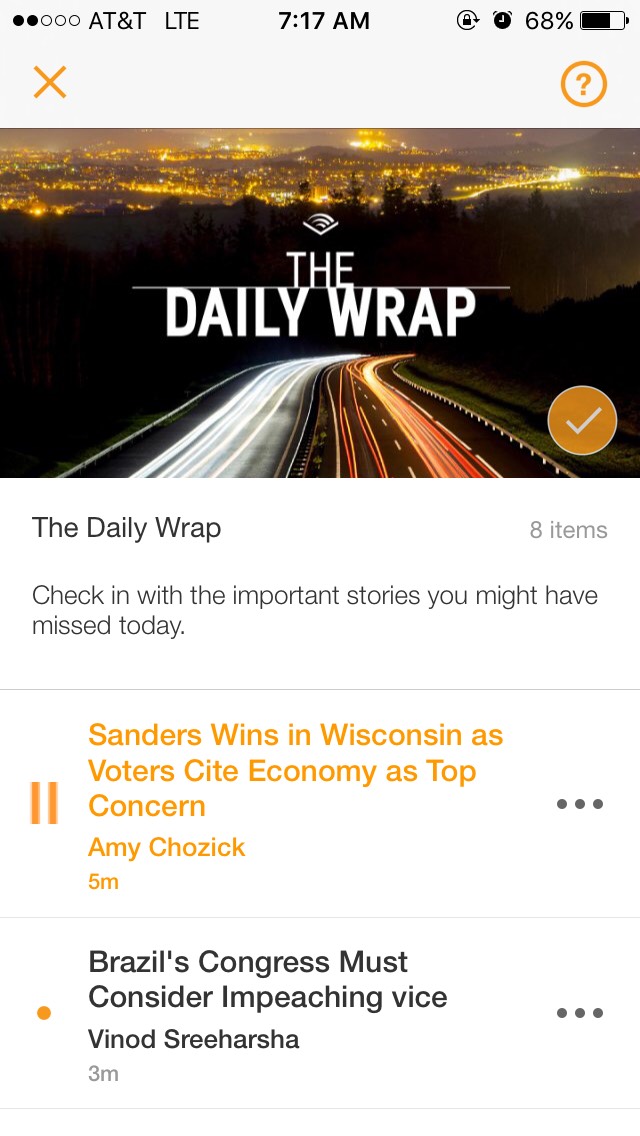
That long-anticipated original content has finally arrived in the form of a new “Channels” section in the Audible mobile app. The section, currently in beta and rolling out on iOS and Android to some Audible members now, streams curated short-form audio — ranging from read-aloud versions of New York Times articles to complete shows from PRI’s The World to episodes of Charlie Rose. Beyond news outlet-specific streams, Audible is serving up its own multi-source collections (examples: “The Daily Rush,” “The Weekender,” “The Conversation: Guns”) which pull in relevant stories from news outlets. The “Guns” collection, for instance, includes a reading of a column by Fred Hiatt about a gun-free society.
Fred Hiatt is of course editorial page editor at The Washington Post, which like Audible and Amazon is led by Jeff Bezos. Post content gets high billing in Audible Channels, but seemingly not any higher than other outlets like the Times and The Wall Street Journal; the top-level offerings are in alphabetical order. Also, there are plenty of other non-news offerings in Channels — readings of sad Anton Chekhov stories, comedy mixtapes, and more. We’re focused here just on the news bits.
Users can choose to follow specific streams and download individual stories to a customizable “My Channel.” There’s no option to just search, but users with access can browse by standard categories such as Arts & Entertainment, Business, News, Politics & Global Affairs, and Science. There is also a category for Shows & Podcasts that includes Audible-specific content. (We’ve included a ongoing list of publishers currently available in Channel’s news categories at the bottom of the story.)
 For publishers who are already producing audio, linking up with Audible seems relatively straightforward: PRI, for instance, started working with Audible on this initiative last year, and is now delivering its daily episodes of The World and some individual story segments from the program through an RSS feed, according to PRI’s senior director of digital distribution Morgan Church.
For publishers who are already producing audio, linking up with Audible seems relatively straightforward: PRI, for instance, started working with Audible on this initiative last year, and is now delivering its daily episodes of The World and some individual story segments from the program through an RSS feed, according to PRI’s senior director of digital distribution Morgan Church.
Short-form content in the Channels section is selected by Audible editors; text-based stories are read by a voice artist (“I’m Christy Burns, reading from The New York Times U.S. section”).
The rollout has been quiet, as Channels is still in beta and not appearing for every user. Chatter has floated around online as early as last fall, however, and a Reddit user posted about it a few days ago:
A sign of the state of things in 2016: when Reddit figures out what you're working on 4 days before any media does. https://t.co/NYnlltiFKf
— Eric Nuzum (@ericnuzum) April 6, 2016
“To be honest I was going to cancel my subscription next month but I really like the idea of channels,” wrote Reddit user Karmometer. An Audible representative replied to note that Channels content won’t include full audiobooks but would instead usually be content between a minute and an hour long.
The most basic-level Audible membership costs $14.95 a month; the new content streaming in Channels is free and unlimited for members.
New audio is being added regularly throughout the beta process, according to an Audible spokesperson, and once the product launches publicly (no word yet on when), even more original content from Audible will be made available. When asked whether non-subscribers might gain access to Channels, she said: “We are always looking to make our innovations available to more customers and plan to use insights from the beta period to inform our distribution strategy. Stay tuned!”
The potential impact of Audible’s move into short-form audio, particularly news, is obvious. Amazon is a giant company. Audible has a large and established base of paying subscribers. (Though, in Amazon style, it doesn’t seem to release subscriber numbers; it says its users downloaded 1.6 billion hours of audio last year.) It’s easy to see how The Washington Post could, with a little investment, be turned into an engine of audio news. As Nicholas Quah mused in an issue of Hot Pod from last summer: “I look forward to Audible mopping the floor with our faces. I mean, we can run and fight all we want, but at the end of the day, the Bezos comes for us all.” As we’ve written about and Adam Davidson wrote about yesterday at some length, we appear to entering a phase of the market where podcasts — traditionally distributed via open RSS channels, available for download to any podcast app — are shifting into verticalized, producer-specific experiences. Think Earwolf’s Howl, Acast’s app, Gimlet’s membership, or now Audible’s Channels. Audible has a big advantage in that battle: It’s starting with a big base of dedicated paying users, rather than trying to build one from scratch. It remains to be seen how successful that sort of silo strategy is in the market, but Davidson argues that that approach might be the best hope for building a substantial audio news ecosystem outside public radio:At some point soon, there will be one or two or more major new players who are trying to create a complete vertical podcasting-first operation: they will have a potent app with lots of awesome bells and whistles for sharing, search, and discovery. They will control the full experience, from content creation to distribution and ad sales. They’ll work a bit like Facebook or Apple’s products, they will benefit from keeping their users inside their own products, so they will need to offer them a steady stream of compelling content…
They will do this at scale and will be well capitalized. They will want a few big flagship shows that draw a lot of elite attention and praise, even if they are money losers. This is when we will see the creation of major news shows. They’ll likely partner with other operations — maybe ProPublica or the NY Times or, even, NPR. My sense is Audible and Panoply and Acast are Scripps/Earwolf may be moving in this direction already…
These large players will be concerned about getting new audiences and making sure that existing audiences come to the app every day and linger on it for longer and don’t go off to someone else’s app. I would expect that news will become an essential part of this competitive strategy. News shows won’t build that catalog, while evergreen shows won’t have immediacy and a reason to return to listen right now. So, a slate of shows that includes evergreen shows (including substantive ones, like Planet Money, that help listeners understand the news) alongside a daily news show — with a passionate, smart, engaging host and great, substantive and compelling produced content — will be a compelling mix and will be no slouch.
List of news-related organizations currently represented in the app:
APM (Marketplace)
Charlie Rose
CNET
Forbes
Foreign Affairs
Smithsonian Magazine (curated highlights from The Future is Here Festival)
Harvard Business Review
MIT Technology Review
National Review
Newshour from BBC World Service
New Republic
The New York Times
The Onion
PRI
Reader’s Digest
Science News Magazine
Scientific American
The Wall Street Journal
The Washington Post